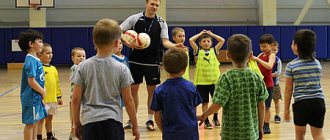Why do many parents actively use physical force on their children? The reasons behind this phenomenon are quite deep. But physical punishment, being extremely harmful, can be replaced by much more effective and humane alternatives.
Some argue that “it is necessary to spank a child before he grows up.” And this is a tribute to tradition. After all, in Rus', birch rods were an integral element of education. But today everything has changed, and physical punishment is equivalent to medieval executions. True, for many this question is important and remains open.
Do you hit your child? ALL PEOPLE DO THIS
Taking a closer look at my friends, I noticed that everyone experiences irritation, they just express it differently. I found many references on the Internet on the topic “I hit my child.” And here’s what’s interesting: over and over again, maternal confessions resonate with forum users in the style of “How we understand you.” Although there is also a lot of condemnation, after one story another is told, and now confession becomes collective. Forum participants note that they felt better when they learned that everyone is angry with children. Having started consulting parents in kindergarten, I realized that for many, constant dissatisfaction with their child is a serious obstacle and a problem no less than his whims.
But the question itself is incorrect. Negative emotions are an integral part of the functioning of a healthy psyche. Emotions and feelings cannot be assessed from a moral or ethical point of view. The only question is what we do with them next.
STIMULUS - RESPONSE
Irritation, anger, anger are condemned precisely because people are often unable to use their energy for good, destroying relationships with loved ones or spoiling their own health. Here's how parental anger can manifest itself:
- “I get very angry when I hear whining and whining. I start up almost immediately. I don’t go as far as assault, but I can scream at a child very loudly”;
- “When whims or hysteria continue for a long time and he does not calm down, despite my peaceful actions, I drag my son into the bathroom and close the door”;
- “When I’m angry, I can break his toy in anger”;
- “It’s gotten to the point where I spank him with all my strength, putting all my anger into it, and, God forgive me, at such moments I think that I would even kill him! Yes, I believe that it’s creepy to even read, but... how much I judge myself, and what an enormous feeling of guilt, and... fear (both for him and for myself).”
All this looks unattractive, especially considering that some of those who spoke out are mothers of infants. To figure out what to do and not bring ourselves to sin, let's think about what chain of reactions we are dealing with.
Alternative measures do not work: what to do?
Many parents, reading such advice, begin to think that the authors live in some kind of parallel or ideal reality, in which the child is always obedient, and the mother is always calm and balanced.
Of course, there are situations when requests, persuasion, and explanations are not able to help calm and bring a stubborn or enraged child to a normal emotional state.
In such a situation, as some experts are sure, a light slap can switch attention and become a kind of inhibitor of a psycho-emotional surge. Naturally, the strength of the spank must be controlled (as well as your mental state).
In addition, corporal punishment (we are not talking about flogging in this case) is not excluded if:
- childish behavior poses a direct threat to the life and health of the little hooligan (poking fingers into sockets, playing with fire, moving towards the road, approaching the edge of a cliff, etc.);
- the child has crossed absolutely all limits of what is permitted, clearly trying to piss you off, and he does not respond to other disciplinary measures and may even behave inappropriately (see the previous paragraph).
After a light spanking, it is imperative to explain what the punishment was for and how to behave correctly. Don’t forget to also say that it is the action you don’t like, and not the child himself. You still love him.
ORIGINAL CONDITION
It can be blissful: I slept, rested, watched a good comedy. Or maybe not so much: fatigue after a sleepless night or a working day, troubles, just “tired” from a lot of things to do or a feeling of hunger. We are only at the beginning of the chain, but believe me, all these factors greatly influence whether we hit a child or not. This means you can go to bed early, eat on time, and find opportunities to please yourself. And, of course, carefully monitor yourself so that the child does not become a lightning rod.
Opinion of American scientists
The truth that childhood experiences influence later life is familiar to everyone. Physical violence from loved ones is a common factor in the development of psycho-emotional disorders and neurological diseases in adulthood.
Scientists from the United States studying the consequences of using physical punishment for educational purposes provide some shocking data. Thus, people who were regularly slapped and slapped on the head were characterized by reduced intellectual abilities.
In especially severe cases, we were even talking about mental and physical impairments, since the centers responsible for processing and storing information, speech and motor functions were seriously damaged.
In addition, according to the same American scientists, children subjected to corporal punishment are more prone to vascular diseases, diabetes, arthritis and other equally serious diseases as they grow up.
Also, teenagers whose childhood was marred by parental aggression are more likely to become drug addicts, alcoholics and criminals. They also adopt a cruel parenting style and transfer it to their own children. That is, a kind of vicious circle is formed in which aggression gives rise to cruelty.
It should still be noted that this work was criticized by other experts. Some scientists felt that there were certain excesses in the data presented. For example, the researchers did not bother to divide into groups sadistic parents and those mothers and fathers who occasionally use light corporal punishment.
That is why it is extremely difficult to judge whether spanking and slaps on the head can actually lead to mental impairment or heart problems in adulthood.
STIMULUS
The child did something and thereby caused irritation in you, which, like an internal barometer, tells us: “Pay your attention to this!” Otherwise, we would never have understood that children need to be raised. The strength of irritation is influenced by the unexpectedness of the stimulus and its duration. If an elder hits a child, we will be much more indignant than if he splashes himself with soup. You will be very angry if, considering your child to be crystal honest, you suddenly find out that he stole something from a classmate. What matters is whether the “bad behavior” continues or not. If your initial state was not too rosy, then the child’s chances of experiencing the full force of your rage increase.
Methods of educational work
As soon as the toddler begins to move independently on his legs, he is inevitably exposed to educational influence from adults. "Do not go there! Don't pick up the poop! Get away from the TV!” – the baby does something wrong all day long. What are the types of educational measures?
Throughout its history of development, humanity has formed three educational methods:
- authoritarian;
- democratic;
- mixed.
In the first case, the child is subjected to training or drilling: he is obliged to accurately carry out all the orders of adults, otherwise he will be punished. The baby gets used to this educational style. It’s good if it is not accompanied by physical suggestions.
The democratic method involves communicating with the little one, giving him the right to express his opinion and defend his position. Parents who spare no effort in the educational process are ready for this style of communication and want to form a holistic personality with a sense of human dignity out of the child.
With a mixed style, there is “carrot and stick” depending on the circumstances. Where necessary, they tightened the nuts, where necessary, they released them. Basically, “the screws are tightened” according to the mood: when mom/dad is too lazy to explain the truths.
SITUATION ASSESSMENT AND FIRST RESPONSE
Next you ask yourself two questions: “What should I do?” and “What should I do right now?” Some stimuli may be noticeable but not very significant, and the adult will say, “No big deal.” In this case, the irritation reaction, as soon as it has arisen, fades away. But if the incentive is serious, then you are outraged by the action of your offspring. Negative emotion is again of great importance: it helps to “hold” the situation without being distracted by something else. And at this stage you need to tell him: “I’m dissatisfied with you!” If you are aware of your feelings and talk about them to your child, then, most likely, you will not reach the point of assault.
ACCUMULATION
If you were unable to cope with the situation, then there is a high probability that you will soon become angry, especially if the child continues to do things to spite you. At this stage, you can still talk to him, and that's half the success. It is ineffective to throw accusations: “Are you a fool to behave this way?” – or demand “stop immediately.” But the intensity of passions can be reduced if you express what you think the child feels and open up to him about what you are experiencing. Whatever one may say, a tense conversation is still better than a spanking.
DISCHARGE AND RECOVERY OF IRRITATION
If you could not control yourself, then you will “discharge” in a strong cry, breaking things or in a fight. And then you will feel guilty, realizing that you again directed the power of your emotions not against the problem, but against the child.
Remember: at each step in this chain, you can stop to reduce the intensity of your irritation, preventing it from developing into difficult-to-control anger. Anger, indignation and rage are a normal reaction to a child’s provoking behavior, but you are quite capable of not going over the line.
WARNING: DOMESTIC VIOLENCE!
When irritation becomes a constant background of communication between parent and child, it ceases to carry its positive load. I noticed that after an aggressive release, parents feel guilty, begin to reproach themselves, and promise “never again.” But only until next time. All this is very reminiscent of the “circle of violence”: a period of increasing tension – aggressive release – guilt – “honeymoon” – increasing tension. During the “honeymoon,” mothers try to behave especially affectionately, shower the child with gifts and allow more than they should. But the tension begins to accumulate faster and faster each time, the “honeymoon” periods shorten, and now the episodes of beating the child cease to be episodes. And the feeling of guilt decreases every time.
A domestic abuser (be it a parent beating a child or a husband abusing his wife) is characterized by a “it’s his own fault” attitude. An abusive parent can spend hours talking about all the “atrocities” of the child, for which he deserves nothing but a spanking. Hitting, poking, shoving, and insults become commonplace. And if you can leave a husband who beats his wife and get a divorce, then where can the child go?
Remember: the circle of violence closes only when the parent looks for an excuse (“I’m too tired,” “no one helps,” “they beat me too”) and shifts responsibility to the child (“he deserves it”), and the child can “earn it” in any way. age, even before reaching a year.
Emotions, irritation, anger and anger are sthenic, in other words associated with significant energy production. They provide strength that we need to use somewhere. Irritation, anger and anger are only bad if they are used in the wrong way. They give us energy, and we are quite capable of directing it to solve the problem, and not against the child.
EXPERT OPINION Tatyana Popova, child psychologist IN A FAST OF POWERLESS
Parents justify physical violence by the need for punishment. I agree that punishment is very important, but punishment and assault have nothing in common. Most often, parents beat their children out of powerlessness. Powerlessness in the face of one’s own unbearable feelings (anger, anger, resentment, disappointment), a feeling of helplessness in trying to influence the child. Helplessness is generally an unbearable feeling, and often it is not realized. Therefore, parents explain their breakdowns with anything (usually the characteristics of the child), but not by the fact that they themselves lack the mental resources to cope with their condition. The problem is not that the person is angry with the child and feels that he is ready to “beat” him, but that he does not cope with the task of processing these feelings. He lacks patience, endurance, and emotional maturity. An important point: if a parent, as a child, was subjected to physical violence, then it will be difficult for him to avoid repeating this in raising his children.
aggressionparenting forbidden feelingsangerviolenceirritation
“I want to hit a child” - is this normal?
The question of whether to beat or not to beat a child, as a rule, appears to parents when their beloved child turns two or three years old.
During this age period, personality formation occurs, the baby also absorbs various information, equips himself with new skills and studies the limits of what is permitted.
Obviously, such a process of growing up must be accompanied by various troubles, since the child learns about the world through trial and error. He studies and tests literally everything, and such behavior often poses a danger to children's health.
It is quite natural that every parent tries to protect their baby from various traumatic situations. It is also clear that when such cases arise, mothers and fathers are overwhelmed by bright and strong emotions.
In addition, children at the age of three enter a special crisis period, when stubbornness, despotism, negativism, obstinacy, and willful “notes” appear in their behavior. Some kids become completely uncontrollable.
Adolescents are also not distinguished by exemplary behavior; they are prone to egocentrism, maximalism and a tendency to manipulative actions.
That is why infrequent outbursts of anger and the desire to spank their beloved child in their hearts visit even the most loving and most liberal parents. And this is quite normal, however, there are situations when the desire to physically punish a child can be considered something abnormal.











